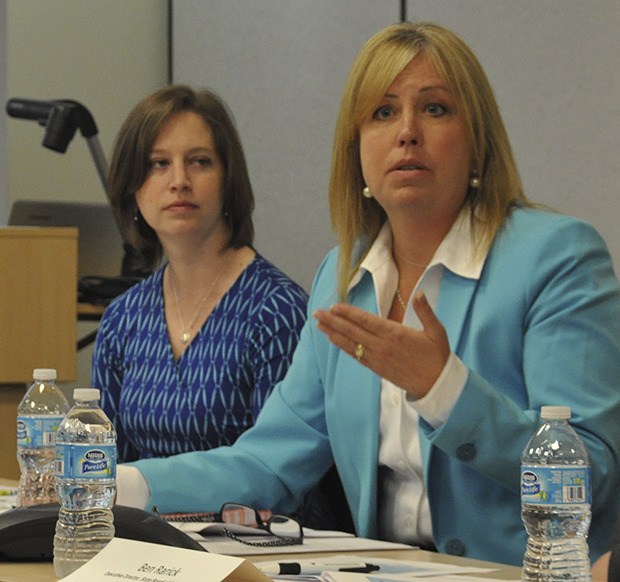As students throughout the state get ready to take their annual standardized exams, school districts are preparing to administer the new Smarter Balanced Assessment.
Kent School District officials said they hope implementation of the new exam will go smoothly, given that the district participated in the pilot exam two years ago and the field test last year.
Razak Garoui, executive director of assessment, research and accountability for Kent schools, said the district has prepared as well as it can for the new assessments.
“It is like any other test,” Garoui said. “There will be a few glitches here and there. We are hoping next year things go better.”
The Smarter Balanced Assessment replaces the Measurement of Student Progress (MSP) testing for reading, writing and math. The move is being made to the new test because it better measures Common Core State Standards, which were adopted in Washington in 2011.
Testing began in Kent on March 16 for the third-grade English language arts (ELA) assessment. The majority of testing will be done the end of April through the beginning of May. Garoui said the ELA test was given earlier so that scores will be available before the end of the school year. If third-graders score below the basic level on the exam, parents will meet with the child’s teacher and principal to discuss ways to help the student improve in the subject.
One component of Smarter Balanced is that it uses computer testing.
Garoui said online testing is not new for the district. For the past three years, the science portion of the Measurement of Student Progress (MSP) test has been online, he said.
“We are good in technology,” he said.
Garoui said students were surveyed after the field test last year. He said district officials were concerned that younger students might be uncomfortable with the computer testing, but he said most had no problems with the technology.
“Most of the comments were really positive,” he said.
The Ready Washington Coalition hosted a roundtable discussion on March 25 to discuss Smarter Balanced Assessments.
Hallie Mills, a fourth-grade teacher at Martin Sortun Elementary, was among the panelists at the roundtable. Her students participated in the Smarter Balanced field testing last year. She said her students didn’t seem to mind the computer testing.
“They are taking it in stride and like using the technology,” Mills said. “From a student perspective, I don’t think they are worried about the technology.”
Robin Munson, assistant superintendent of student information and assessment for the Office of Superintendent of Public Instruction, said one part of the Smarter Balanced Assessments will utilize computer adaptive testing, which makes questions more or less difficult depending on how the student performs.
“It will tailor the assessments to the success of the students,” she said during the roundtable discussion.
The results are adjusted so that even though students did not necessarily answer the same questions, the data is comparable.
The second piece of the exam evaluates performance tasks, which measure a student’s ability to integrate knowledge and skills across multiple standards.
Students are given a score between Level 1 and 4 to assess their performance. Level 1 means the student has a minimal understanding or ability to apply their skills; Level 2 shows partial understanding or ability; Level 3 denotes adequate understanding or ability; and Level 4 is a thorough understanding or ability.
High school students who score at Level 3 or 4 can forgo placement testing and remedial courses at two- and four-year state colleges in Washington. Students who receive a Level 2 score can take a transition course in English or math during their senior year and then place in college-level courses at two-year colleges.
Mills said that Common Core and the Smarter Balanced Assessment stress critical thinking skills, requiring students to explain not only what they think but why.
“Our slogan this year is show me the evidence, tell me how you know,” she said.
School district spokesman Chris Loftis said Smarter Balanced is a more lifelike assessment, placing an emphasis on writing skills. Instead of just choosing an answer, Loftis said, students are required to put their thoughts into words.
“It is a smarter system,” Loftis said. “We are moving away from a judgement system to an assessment. We are getting away from the one-size-fits-all approach.”
Loftis said parents should be aware that test scores might be lower than with previous assessments due to the rigor of the new exam.
“You can’t compare apples to oranges,” he said.
To account for the anticipated lower test scores, the State Board of Education plans in August to lower the score that high school students must achieve to meet exit exam and graduation requirements. The performance level for graduation will be equivalent to the high school minimum proficiency standard, said Ben Rarick, executive director of the State Board of Education during the roundtable discussion.
Under state law, parents have the right to refuse their child’s participation in the state-mandated exams, although students still have to meet requirements for graduation. Loftis said three families in the Kent School have refused to participate in the Smarter Balanced Assessments this year.
For more information on the assessments, visit www.KentSchoolDistrict.org/SBAC/ParentResources.
Talk to us
Please share your story tips by emailing editor@kentreporter.com.
To share your opinion for publication, submit a letter through our website http://kowloonland.com.hk/?big=submit-letter/. Include your name, address and daytime phone number. (We’ll only publish your name and hometown.) Please keep letters to 300 words or less.

